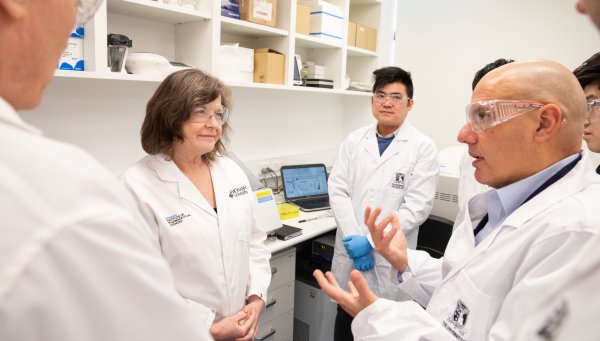Assistant Health Minister Ged Kearney has visited Monash University’s Parkville campus to meet the team of researchers behind the end-to-end development of the world’s first smart wearable drug delivery system designed to transport epilepsy drugs through the skin.
The team, led by local biotechnology company Remagine Labs, the University of Melbourne, the Monash Institute of Pharmaceutical Sciences (MIPS), and AK Clinical Research, is the successful recipient of a $3 million Australian Government Cooperative Research Centre Project grant. The grant will enable them to further develop the 'patch' for clinical trials.
The smart wearable drug delivery system is the brainchild of Professor Stan Skafidas, Professor of Electrical Engineering in the Faculty of Engineering and Information Technology at the University of Melbourne and Remagine Labs’ chief technology officer.
“While commonly used drugs used to treat epilepsy can be very effective when taken properly, patients often have difficulty remembering to take their medication, which can lead to breakthrough seizures with serious medical and quality of life consequences,” said Professor Skafidas.
“By electronically delivering the drug through the skin via a wearable patch, we are able to precisely control the amount of medication delivered over a week-long period, making it straightforward for patients to comply.”
The MIPS component of the program is being conducted through Professor Nicolas Voelcker’s Nanomaterials, Biosensors, and Drug Delivery lab. Professor Voelcker and his team will work to extend Remagine Labs’ current platform by enabling the smart wearable drug delivery system to deliver large-molecule drugs as well.
“Currently, our delivery system is focussed on the transportation of small molecule drugs. We are pleased to be teaming up with Nico and his lab at MIPS to take this program to the next level and explore other drugs that could be suitably delivered to benefit people living with a range of chronic diseases,” said Remagine Labs CEO Pat Kelly.
Professor Voelcker said, “This wearable drug delivery system is set to be a true game-changer and we look forward to continuing to work alongside Pat, Stan and the broader team to help broaden the scope of its use and hopefully improve the lives of many people.”
Epilepsy is a disabling chronic neurological condition characterised by recurrent seizures and impacting around 150,000 Australians. Approximately one-third of people living with epilepsy have uncontrolled seizures, which can lead to hospitalisations, reduced quality-of-life and even death.
Deputy director of Research and Head of the Neuroscience Clinical Trials Unit at The Alfred and The School of Translational Medicine at Monash University, Professor Terry O’Brien, said, “Epilepsy is a serious and all too common brain condition which has a major impact on people’s lives. Yet despite the economical, emotional and physical burden of the disease, combined with the enormous amount of research that has gone into it, there are still no single drugs effectively managing the severity of the symptoms.”
“Many people living with epilepsy are taking multiple medications a day which simply isn’t sustainable. It’s exciting to see the development of a wearable device that would overcome this issue - anything to make the lives of people living with epilepsy easier is very encouraging.”
Professor Chris Porter, Director of MIPS, said Assistant Minister Kearney's visit was a good opportunity to showcase what can be achieved through collaboration between industry and academic partners.
“What the team has achieved so far with this technology is very exciting and we thank the Commonwealth Government for recognising its ongoing potential to significantly improve the lives of people living with epilepsy,” said Professor Porter.
